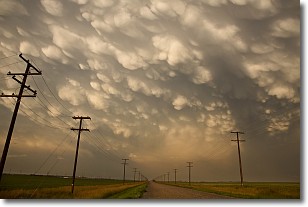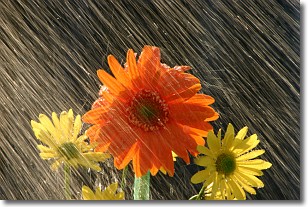Weather Alert in Kansas
Flood Watch issued June 6 at 12:09AM MDT until June 7 at 6:00AM MDT by NWS Dodge City KS
AREAS AFFECTED: Meade; Clark; Comanche; Barber
DESCRIPTION: Heavy rains have left areas soils saturated to the point any additional rainfall will become excess runoff especially in areas south of the highway 400 corridor. Additional rainfall of 2 to 3 inches is expected between 7 pm and midnight in the southwestern most counties, leading to scattered to even numerous instances flash flooding in the watch area This Evening. * WHAT...Flooding caused by excessive rainfall continues to be possible. * WHERE...Portions of south central and southwest Kansas, including the following counties, in south central Kansas, Barber and Comanche. In southwest Kansas, Clark and Meade. * WHEN...Through Saturday morning. * IMPACTS...Excessive runoff will result in flooding of rivers, creeks, streams, and other low-lying and flood-prone locations. Low-water crossings may be flooded. Extensive street flooding and flooding of creeks and rivers are possible. Area creeks and streams are running high and could flood with more heavy rain. * ADDITIONAL DETAILS... - Heavy rains have left areas soils saturated to the point any additional rainfall will become excess runoff especially in areas south of the highway 400 corridor. Additional rainfall of 2 to 3 inches is expected between 7 pm and midnight, leading to scattered flash flooding in the watch area. - http://www.weather.gov/safety/flood
INSTRUCTION: You should monitor later forecasts and be alert for possible Flood Warnings. Those living in areas prone to flooding should be prepared to take action should flooding develop.
Want more detail? Get the Complete 7 Day and Night Detailed Forecast!
Current U.S. National Radar--Current
The Current National Weather Radar is shown below with a UTC Time (subtract 5 hours from UTC to get Eastern Time).

National Weather Forecast--Current
The Current National Weather Forecast and National Weather Map are shown below.

National Weather Forecast for Tomorrow
Tomorrow National Weather Forecast and Tomorrow National Weather Map are show below.

North America Water Vapor (Moisture)
This map shows recent moisture content over North America. Bright and colored areas show high moisture (ie, clouds); brown indicates very little moisture present; black indicates no moisture.

Weather Topic: What are Mammatus Clouds?
Home - Education - Cloud Types - Mammatus Clouds
 Next Topic: Nimbostratus Clouds
Next Topic: Nimbostratus Clouds
A mammatus cloud is a cloud with a unique feature which resembles
a web of pouches hanging along the base of the cloud.
In the United States, mammatus clouds tend to form in the warmer months, commonly
in the Midwest and eastern regions.
While they usually form at the bottom of a cumulonimbis cloud, they can also form
under altostratus, altocumulus, stratocumulus, and cirrus clouds. Mammatus clouds
warn that severe weather is close.
Next Topic: Nimbostratus Clouds
Weather Topic: What is Precipitation?
Home - Education - Precipitation - Precipitation
 Next Topic: Rain
Next Topic: Rain
Precipitation can refer to many different forms of water that
may fall from clouds. Precipitation occurs after a cloud has become saturated to
the point where its water particles are more dense than the air below the cloud.
In most cases, precipitation will reach the ground, but it is not uncommon for
precipitation to evaporate before it reaches the earth's surface.
When precipitation evaporates before it contacts the ground it is called Virga.
Graupel, hail, sleet, rain, drizzle, and snow are forms of precipitation, but fog
and mist are not considered precipitation because the water vapor which
constitutes them isn't dense enough to fall to the ground.
Next Topic: Rain
Current conditions powered by WeatherAPI.com




